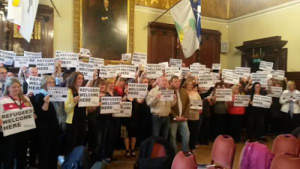 Our branch has a proud history of welcoming refugees and asylum seekers and wants to highlight that this week is World Refugee Week and 20th June is World Refugee Day.
Our branch has a proud history of welcoming refugees and asylum seekers and wants to highlight that this week is World Refugee Week and 20th June is World Refugee Day.
The official theme of the week is ‘Imagine’ and that is very apt just now as we all have been imaging what life will be like after the Cornavirus.
Most refugees leave their countries of origin fleeing war, persecution, famine or poverty. So their hope of a better future is even more compelling.
UNISON has always supported refugees, urging the UK government to welcome refugees and asylum seekers and highlighting their importance to our communities and economies. We have particularly supported family reunification, urging the UK government to allow unaccompanied children and vulnerable people to join their families in the UK.
Locally, there are around 200 refugees or ‘new Scots’ in the Aberdeenshire area, in places like Ellon, Inverurie and Huntly. The branch has welcomed them to our communities and when they first arrived, we were delighted to provide some financial support.
We also note that the third anniversary of the Grenfell Tower tragedy is on 14th June, the day before Refugee Week begins. Many of those who lost their lives were asylum seekers and refugees, looking for a safer life in the UK. We send our deepest sympathy and support to all those who lost loved ones in the tragedy. UNISON continues to fight for answers for those affected by this tragedy. We will not forget.

pledge support to refugees
Refugee Week started in 1998 as a direct reaction to hostility in the media and society in general towards refugees and asylum seekers.
The aims of Refugee Week are
- to encourage a diverse range of events to be held throughout the UK, which facilitate positive encounters between refugees and the general public in order to encourage greater understanding and overcome hostility
- to showcase the talent and expertise that refugees bring with them to the UK
- to explore new and creative ways of addressing the relevant issues and reach beyond the refugee sector
- to provide information which educates and raises awareness of the reality of refugee experiences
The vast majority of refugees – 4 out of 5 – stay in their region of displacement, and consequently are hosted by developing countries. Turkey now hosts the highest number of refugees with 3.7 million, followed by Pakistan with 1.4 million.
How many refugees are there in the UK? Asylum applications to the UK are relatively low – 35,566 in the year to December 2019. This is significantly lower than the peak of 84,000 applications back in 2002. In 2018, Germany received the highest number of asylum applications (161,900), and France the second most (114,500).
The UK offered protection – in the form of grants of asylum, alternative forms of protection and resettlement – to 18,519 people in the year June 2018 – June 2019 (up 29% compared with the previous year) but still a tine percentage. Of these, 25% (or 4,563) were children.
According to the United Nations High Commissioner for Refugees (UNHCR), by the end of 2018 there were 126,720 refugees, 45,244 pending asylum cases and 125 stateless persons in the UK. That’s around one quarter of a percent (0.26%) of the UK’s total population.
